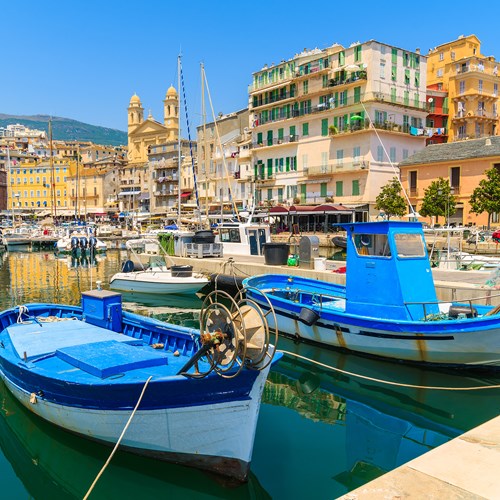
Upper Corsica, France
The small Mediterranean island of Corsica encompasses a bewildering diversity of landscapes, experiences, and delicacies. Though its southern counterpart often steals the spotlight, the region of Upper Corsica lacks for nothing in terms of entertainment, character, and natural beauty. And savvy travellers would do well not to ignore its unmistakable allure, from the peak of Monte Cinto to the island's numerous picture-perfect coastal and hilltop villages.
Population:
141,603
Currency:
1 euro = 100 cents
Emergency Numbers:
Medical: 15
Police: 17
Fire: 18
Mobile emergency number: 112
Opening Hours:
Although business hours may vary, there is often a lunch break at most shops and small businesses, making the customary working hours from 8.30 or 9am to 1 or 1.30pm & 2 or 2.30 to 6 or 7pm. Most businesses close on Sundays.
Newspapers:
The Island

After centuries under Genoese rule and a brief stint as an independent republic (lasting just a decade and a half), Corsica was ceded to King Louie XV in 1769, and has remained a French territory ever since. It is divided into two regions, Upper Corsica and Southern Corsica, and though the southern half tends to garner more praise (and visitors), Upper Corsica has more than its share of attractions, excitement and beauty.
Much of the region is taken up by the Corsica Regional Natural Park, a vast protected area of dense forests and rocky peaks, ideal for hiking and adventurous endeavors. The numerous laid-back coastal towns and beaches are perfect for rest and relaxation, while the regional capital of Bastia offers cosmopolitan comforts and animated city life.
Do & See

Upper Corsica's appeal is undeniable and multifaceted. Explore the region's vast untamed natural wonders for a taste of adventure, find respite as you wander through coastal villages or relax on tranquil beaches, or enjoy the laid-back but cosmopolitan vibe of Bastia for fine dining and nightlife.
Dining

Corsican cuisine has historically relied heavily on local products and ingredients, and those traditions are still very much alive today. Seafood is understandably pervasive, but meat, particularly pork, is an island staple, famous worldwide for its characteristic flavour; local animals are fed a steady diet of chestnuts, another ubiquitous Corsican ingredient, and maquis herbs).
Cafes

Corsican coffee culture is as much about ambience as it is about the drinks. For the best coffee, head to Bastia, where there is a wider selection of speciality coffee shops and baristas take their craft to new heights. For atmosphere, visit the region's numerous quaint cafes in coastal villages and hilltop towns.

